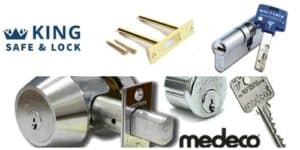Homeowners have to be assertive if finding a reputable locksmith is their goal. Obviously, there are always concerns when letting someone access the home or a vehicle, but when someone is locked out, they may not have another choice. Most people don’t build a relationship with a locksmith until there’s an emergency, and this is precisely the time that people are most vulnerable to being taken advantage of. It is essential that people know what to look for in a professional, and what questions to ask to ensure they aren’t scammed.
Finding a Reputable Locksmith Doesn’t Have to Be Hard
In most ways, locating a trustworthy locksmith is like locating any other professional. Do the research, check the professional out online and know what to ask before committing. There’s more to it, of course, and if a homeowner wants to be completely secure in the professional they choose, they should do the following:
Pick a local certified professional – Do everything possible to verify  that a professional works in the area. It’s best if the professional works for a local shop, as shops have a lot of incentive to treat their clients with respect and honesty. Get the professional’s work address and verify online that no other business is using the address. Professionals certified through the Associated Locksmiths of America (ALOA) are professionals that can generally be trusted, as they have been thoroughly educated in the industry.
that a professional works in the area. It’s best if the professional works for a local shop, as shops have a lot of incentive to treat their clients with respect and honesty. Get the professional’s work address and verify online that no other business is using the address. Professionals certified through the Associated Locksmiths of America (ALOA) are professionals that can generally be trusted, as they have been thoroughly educated in the industry.
Ask to see some documentation up front – Fifteen states, including Texas, require professionals to be licensed, and licensing in Texas means training and passing a criminal background check. Professionals must, by law, keep an identification card on them while working. Ask to see this card. If they don’t have one, do not work with them.
Gauge their professionalism – It’s normal for a locksmith to ask for the client’s identification as well, as they have to confirm that they aren’t breaking into a home or vehicle on their behalf. If they don’t ask for identification, that’s not a good sign.
Get an estimate before signing or agreeing to anything – A favored tactic among scammers is to offer a low price over the phone or online, and then gouge the customer once they have completed the job. They may threaten to call the police if the customer doesn’t pay up right away (call their bluff if this happens). For this reason, it’s best to get a written estimate before the professional starts work. If the written estimate is more than what was quoted over the phone, consider hiring someone else.
 Don’t let the locksmith drill the lock – Drilling the lock is rarely needed, as industry professionals should have all the tools and expertise they need to defeat door and vehicle locking mechanisms. Drilling the lock will effectively ruin it, necessitating an expensive replacement. This is another common scam in the industry. The scammer comes in, claims they need to replace the lock, claims they are replacing it with a “high security” lock, and then charges the customer hundreds of dollars for the work. In almost all cases, this high security lock is just a cheap knockoff. High security locks are much more heavy duty than a standard door lock. This is because of the higher density and higher quality materials used combined with better quality key control. It is a sure sign of being scammed if the replacement feels like a typical door lock.
Don’t let the locksmith drill the lock – Drilling the lock is rarely needed, as industry professionals should have all the tools and expertise they need to defeat door and vehicle locking mechanisms. Drilling the lock will effectively ruin it, necessitating an expensive replacement. This is another common scam in the industry. The scammer comes in, claims they need to replace the lock, claims they are replacing it with a “high security” lock, and then charges the customer hundreds of dollars for the work. In almost all cases, this high security lock is just a cheap knockoff. High security locks are much more heavy duty than a standard door lock. This is because of the higher density and higher quality materials used combined with better quality key control. It is a sure sign of being scammed if the replacement feels like a typical door lock.
Ask for a written invoice – Before paying and saying goodbye, request a written invoice that breaks down all of the relevant fees and lists any replacement parts. The invoice should also include the company’s name, branding and contact information. If there are any discrepancies between the estimate and the invoice, take it up with the company’s management and file a complaint with the Better Business Bureau if they do not satisfactorily resolve the dispute. Also consider filing a complaint with the Federal Trade Commission or even the state attorney general if a resolution is not forthcoming.
Finding a reputable locksmith doesn’t have to be a frustrating experience. As long as a consumer knows what to look for in a professional, they should not get taken in by a scammer.
